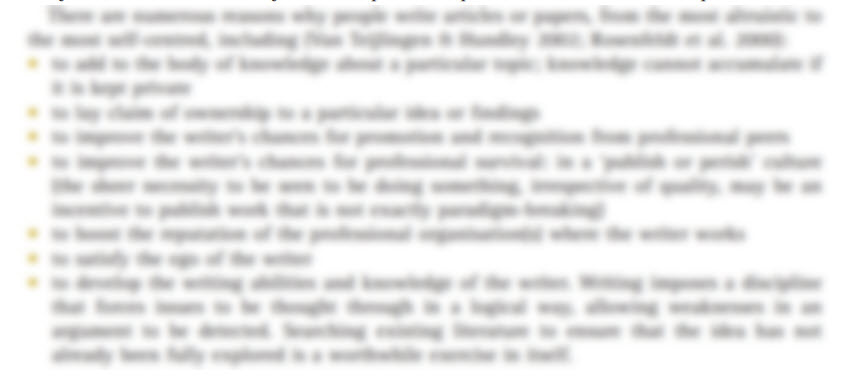Both inexperienced and experienced writers attend my writing workshops and courses to learn how to improve their writing skills. Some display a distinct lack of confidence in their writing ability and describe themselves as poor writers with statements such as, “I am not a very good writer” or “Writing is something I have never been very good at”. Not only does this lack of confidence stem from a lack of experience, but is exacerbated by professional pressure to write well.
Being aware that your writing needs improvement is necessary if you want to improve, but a lack of confidence might indicate that you regularly have negative thoughts about writing. These negative thoughts may prevent effective learning.
How low self-confidence can reduce the quality of your writing
Writing for an audience is a type of performance, similar to getting onstage to sing or act or to give a talk at a conference. Performance anxiety is common for artists and performers and is based on the fear of appearing incompetent or simply 'not good enough'.
Similarly, many writers that lack confidence may suffer from a form of performance anxiety and worry about appearing incompetent or inexperienced. Writers who regularly suffer from low-self confidence could also suffer from “imposters syndrome” which is defined as, “…a false and sometimes crippling belief that one's successes are the product of luck or fraud rather than skill”.
If you suffer from low confidence, make sure it doesn't get in the way of your learning development.
Examples of how low-confidence can adversely affect writers:
- Not applying for the ideal job. Having well-developed written communication skills is a key selection criteria for most science-based professions.
- Spending too much time editing and rewriting in an effort to be absolutely sure that each and every sentence is perfect. This habit of inefficient writing leaves less time for other tasks.
- Overusing the passive voice when presenting your conclusions or the implications of the findings of your study. While the overuse of active voice is also problematic (for other reasons), passive voice can obscure the identity of who is making certain conclusions and it may mask any unique contribution you’ve made to your work. For example, stating “It was thought that X+K = B” leaves the reader unsure whether, (a) it was the author that thought this, (b) it was another uncited author that thought this, or (c) that this statement was simply common knowledge.
- Not submitting a paper to a high-impact journal for fear of rejection or not re-submitting a paper to another journal if first rejected by the initial journal.
- Reducing the impact of your research by using overly cautious language when presenting your findings, even when you have strong supporting data. For example, writing “This study’s findings may prove to be important when considering the impact of diet on gut microflora.” instead of “Our findings are important when considering the impact of diet on gut microflora”. Writers often overuse cautious language when they fear criticism.
- Reducing the impact of your research by using overly cautious or apologetic language when describing the limitations of your study. While it is wise to always mention any factors that limit how widely your findings can be interpreted, it is important not to appear apologetic or lacking in confidence. While it is important to mention factors that might reduce the robustness of your data, it is important to be confident when discussing the design and execution of your study. If you are not confident in the design and execution of your study, then get extra feedback from your supervisor or colleagues about whether to rewrite your limitations.
Avoid labelling yourself as a poor writer
Applying labels to summarise behaviour is problematic if you want the behaviour to change. Continuing to label your skill as being ‘poor’ or ‘bad’ may reinforce negative thoughts about your writing and may it difficult for you to improve and view yourself as a ‘good writer’. Similarly, allowing your colleagues to hear you describe yourself as a poor writer, may reinforce any negative views they may have about your writing skill.
Generally-speaking, self-confidence in your writing ability will build as your writing improves. Rather than worrying about your current skill level, commit to continual self-improvement and aim to feel satisfied with what you have achieved so far.
Some suggestions on how to approach your learning development:
- Acknowledge the parts of your writing that are good and gain confidence from this.
- Identify the parts that need improving and work at improving these skills.
- Monitor how quickly you skills are improving, pay special attention to those areas where you continue to struggle then seek feedback on how to improve these skills.
- Find a good mentor who can give you constructive feedback. Avoid seeking feedback from people who tend to harshly criticise your work.
In the next blogpost I discuss how to build and maintain your confidence as a writer.
© Dr Marina Hurley 2021 www.writingclearscience.com.au
FURTHER READING
- How to build and maintain your confidence as a writer
- The essentials of science writing: identify your target audience
- The essentials of science writing: plan before you write
- The essentials of science writing: What is science writing?
- 8 steps to writing your first draft
- Two ways to be an inefficient writer
- Work-procrastination: important stuff that keeps us from writing
Any suggestions or comments please email admin@writingclearscience.com.au
Find out more about our new online course...
Now includes feedback on your writing Learn more...
SUBSCRIBE to the Writing Clear Science Newsletter
to keep informed about our latest blogs, webinars and writing courses.





